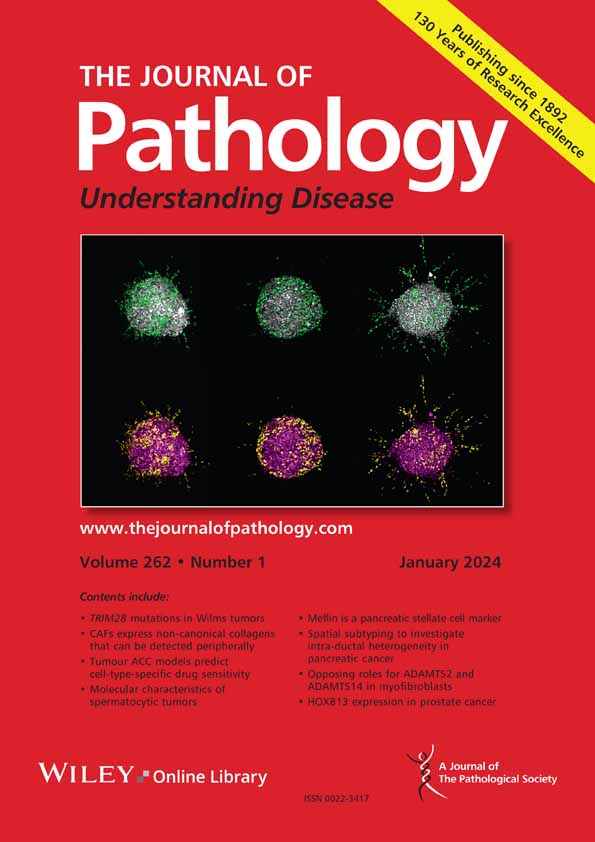Max AK Rätze, Lotte NFL Enserink, Noboru Ishiyama, Sven van Kempen, Christina HJ Veltman, Isaac J Nijman, Wisse E Haakma, Carlos Caldas, René Bernards, Paul J van Diest, Matthias Christgen, Thijs Koorman, Patrick WB Derksen
下载PDF
{"title":"Afadin缺失会破坏E-cadherin与F-actin的连接,从而诱发乳腺癌转移。","authors":"Max AK Rätze, Lotte NFL Enserink, Noboru Ishiyama, Sven van Kempen, Christina HJ Veltman, Isaac J Nijman, Wisse E Haakma, Carlos Caldas, René Bernards, Paul J van Diest, Matthias Christgen, Thijs Koorman, Patrick WB Derksen","doi":"10.1002/path.6394","DOIUrl":null,"url":null,"abstract":"<p>Afadin is a multimodal scaffolding protein with essential functions in cell–cell adhesion. Although its loss of expression has been linked to breast cancer invasion and metastasis, the underlying mechanisms driving tumour progression upon mutational Afadin (<i>AFDN</i>) loss in breast cancers remains unclear. In the current study we identified a somatic frameshift <i>AFDN</i> mutation (<i>p</i>.Lys630fs) in an invasive breast cancer sample that coincides with loss of Afadin protein expression. Functional studies in E-cadherin-expressing breast cancer cells show that Afadin loss leads to immature and aberrant adherens junction (AJ) formation. The lack of AJ maturation results in a noncohesive cellular phenotype accompanied by Actomyosin-dependent anoikis resistance, which are classical progression hallmarks of single-cell breast cancer invasion. Reconstitution experiments using Afadin truncates show that proper F-actin organisation and epithelial cell–cell adhesion critically depend on the Coiled-Coil domain of Afadin but not on the designated C-terminal F-actin binding domain. Mouse xenograft experiments based on cell lines and primary patient-derived breast cancer organoids demonstrate that Afadin loss induces single-cell lobular-type invasion phenotypes and overt dissemination to the lungs and the peritoneum. In short, Afadin is a metastasis suppressor for breast cancer through stabilisation and maturation of a mechanical E-cadherin to F-actin outside-in link. © 2025 The Author(s). <i>The Journal of Pathology</i> published by John Wiley & Sons Ltd on behalf of The Pathological Society of Great Britain and Ireland.</p>","PeriodicalId":232,"journal":{"name":"The Journal of Pathology","volume":"266 1","pages":"26-39"},"PeriodicalIF":5.2000,"publicationDate":"2025-03-03","publicationTypes":"Journal Article","fieldsOfStudy":null,"isOpenAccess":false,"openAccessPdf":"https://onlinelibrary.wiley.com/doi/epdf/10.1002/path.6394","citationCount":"0","resultStr":"{\"title\":\"Afadin loss induces breast cancer metastasis through destabilisation of E-cadherin to F-actin linkage\",\"authors\":\"Max AK Rätze, Lotte NFL Enserink, Noboru Ishiyama, Sven van Kempen, Christina HJ Veltman, Isaac J Nijman, Wisse E Haakma, Carlos Caldas, René Bernards, Paul J van Diest, Matthias Christgen, Thijs Koorman, Patrick WB Derksen\",\"doi\":\"10.1002/path.6394\",\"DOIUrl\":null,\"url\":null,\"abstract\":\"<p>Afadin is a multimodal scaffolding protein with essential functions in cell–cell adhesion. Although its loss of expression has been linked to breast cancer invasion and metastasis, the underlying mechanisms driving tumour progression upon mutational Afadin (<i>AFDN</i>) loss in breast cancers remains unclear. In the current study we identified a somatic frameshift <i>AFDN</i> mutation (<i>p</i>.Lys630fs) in an invasive breast cancer sample that coincides with loss of Afadin protein expression. Functional studies in E-cadherin-expressing breast cancer cells show that Afadin loss leads to immature and aberrant adherens junction (AJ) formation. The lack of AJ maturation results in a noncohesive cellular phenotype accompanied by Actomyosin-dependent anoikis resistance, which are classical progression hallmarks of single-cell breast cancer invasion. Reconstitution experiments using Afadin truncates show that proper F-actin organisation and epithelial cell–cell adhesion critically depend on the Coiled-Coil domain of Afadin but not on the designated C-terminal F-actin binding domain. Mouse xenograft experiments based on cell lines and primary patient-derived breast cancer organoids demonstrate that Afadin loss induces single-cell lobular-type invasion phenotypes and overt dissemination to the lungs and the peritoneum. In short, Afadin is a metastasis suppressor for breast cancer through stabilisation and maturation of a mechanical E-cadherin to F-actin outside-in link. © 2025 The Author(s). <i>The Journal of Pathology</i> published by John Wiley & Sons Ltd on behalf of The Pathological Society of Great Britain and Ireland.</p>\",\"PeriodicalId\":232,\"journal\":{\"name\":\"The Journal of Pathology\",\"volume\":\"266 1\",\"pages\":\"26-39\"},\"PeriodicalIF\":5.2000,\"publicationDate\":\"2025-03-03\",\"publicationTypes\":\"Journal Article\",\"fieldsOfStudy\":null,\"isOpenAccess\":false,\"openAccessPdf\":\"https://onlinelibrary.wiley.com/doi/epdf/10.1002/path.6394\",\"citationCount\":\"0\",\"resultStr\":null,\"platform\":\"Semanticscholar\",\"paperid\":null,\"PeriodicalName\":\"The Journal of Pathology\",\"FirstCategoryId\":\"3\",\"ListUrlMain\":\"https://pathsocjournals.onlinelibrary.wiley.com/doi/10.1002/path.6394\",\"RegionNum\":2,\"RegionCategory\":\"医学\",\"ArticlePicture\":[],\"TitleCN\":null,\"AbstractTextCN\":null,\"PMCID\":null,\"EPubDate\":\"\",\"PubModel\":\"\",\"JCR\":\"Q1\",\"JCRName\":\"ONCOLOGY\",\"Score\":null,\"Total\":0}","platform":"Semanticscholar","paperid":null,"PeriodicalName":"The Journal of Pathology","FirstCategoryId":"3","ListUrlMain":"https://pathsocjournals.onlinelibrary.wiley.com/doi/10.1002/path.6394","RegionNum":2,"RegionCategory":"医学","ArticlePicture":[],"TitleCN":null,"AbstractTextCN":null,"PMCID":null,"EPubDate":"","PubModel":"","JCR":"Q1","JCRName":"ONCOLOGY","Score":null,"Total":0}
引用次数: 0
引用
批量引用






 求助内容:
求助内容: 应助结果提醒方式:
应助结果提醒方式:


